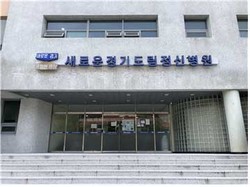New Gyeonggi Province Mental Hospital (NGPMH) said Wednesday that its 24-hour hospitalization system for psychiatric emergency patients has shown innovative results in treatment effect.

The hospital said that the system has improved health indicators in terms of emergency hospitalization, quality of treatment, connection to local services, and prevention of recurrence. In addition, it enabled rapid inpatient treatment for critically ill psychiatric patients with the risk of self-harm or harm to others.
Besides, the hospital managed to improve clinical treatment through high-quality intensive treatment reflecting the needs of those in psychosocial crisis and their families and linking with active local mental health services, according to NGPMH.
This is a meaningful achievement that shows that significant improvement is possible, it added.
Psychiatric emergencies are often accompanied by dangerous situations such as self-harm and harming others, and patients often refuse treatment.
"Therefore, there are many cases where the patients come into the emergency hospitalization treatment through the police," the hospital said. "However, many patients have been left at risk due to the absence of a private hospital that can provide emergency admission at night and on holidays."
To solve this problem, Gyeonggi Province has been operating the hospital as a consignment project to perform emergency hospitalization by the police and administrative hospitalization by the head of the local government since June of last year.
As a result, the hospital admitted 201 emergency patients for about 15 months from its opening on June 11, 2020, to Aug. 30 this year, with 82 percent of the admission conducted at night or on holidays when access to private hospitals was difficult.
"In light of the total number of emergency hospitalizations in Gyeonggi Province in 2020, we believe we have performed our duties well as a public hospital that covers nighttime and holiday hours, vulnerable time for mental patients," the hospital said. "This is because about 81 percent of all inpatients were non-inpatients with risk of self-harm or harm to others, much higher than the national psychiatric institution's non-inpatient admission of 32.1 percent."
The hospital emphasized that it is the only hospital in Korea where most of the patients consist of critically ill patients with high-risk mental illnesses, with more than 75 percent of the hospital's patients suffering from severe mental disorders, such as schizophrenia and affective disorder.
The hospital stressed that it has also faithfully performed its function as a public hospital responsible for hospitalizing critically mentally ill patients. It has willingly allowed the emergency hospitalization of AIDS-infected patients, sexual offenders, and adolescent patients, whom private hospitals avoid treating due to the high risks and difficulties.
In its efforts to provide better treatment for people with mental health conditions, the hospital also stressed that it has achieved important results in the clinical effectiveness of acute psychiatric inpatient treatment.
The hospital pointed out that in the course of mental emergency treatment, it had been customary to perform first aid, in which the hospital binds patients’ limbs using bands to secure the safety of violent patients and people around them.
"However, as various researches have confirmed that this physical constraint leaves serious physical and mental aftereffects and impedes the long-term recovery of patients, the World Health Organization and advanced countries recommend eliminating the compulsive treatment and introducing human rights-based alternative treatment," the hospital said.
NGPMH is the first Korean public hospital to introduce human rights-based non-coercive treatment that minimizes the psychological trauma of patients in the early stages of hospitalization by avoiding physical compulsion as much as possible and replacing them with new treatment techniques such as gradual stabilization and operation of an emergency response team, it added.
Last year, the hospital used physical constraints to only 5 percent of all inpatients, one-sixth of the 2015 National Human Rights Commission statistics, revealing about 29 percent of psychiatric hospitalizations nationwide experienced physical coercion.
"As an acute-stage hospital that cares for the most at-risk patients, the results are a very significant advance in treatment technology," the hospital said. "In the future, New Gyeonggi Province Mental Hospital plans to implement the non-compulsive principle for mental emergency patients by expanding facilities and systems."
Such human rights-based treatment helps patients in psychological crisis to trust the hospital's services by providing sufficient comfort and reassurance, it added.
The hospital also provides intensive case management services by assigning mental health specialists as individual managers from the beginning of hospitalization to naturally connect to rehabilitation treatment at local mental health welfare centers after discharge.
"Although the average hospital stay was as short as 21 days by shortening the hospitalization period through this intensive recovery treatment, the ratio of linkage to community mental rehabilitation institutions after discharge was 77 percent in 2021, almost twice as higher than the community linkage rate of 43 percent for inpatients with schizophrenia," the hospital said. "This intensive treatment was proven to be effective by reducing the readmission rate of patients discharged from hospital after short-term inpatient treatment at New Gyeonggi Province Mental Hospital."
In the case of NGPMH, the readmission rate of all inpatients within one month after discharge was 6.9 percent, also one-sixth of the national average, it added.
Moving forward, the hospital plans to continue its works to improve treatment for people with mental health conditions.
"In June, the WHO published the 'Guidelines for Local Mental Health Services Based on People and Human Rights,'" the hospital said. "Among them, non-coercive therapy and open dialogue are key elements of acute treatment guidelines, and the hospital has become the first medical institution to implement an intensive case management service combined with peer support service."
The hospital also started a pilot project for activating acute treatment and hospital-based case management to enhance the quality of initial inpatient treatment, it added.

